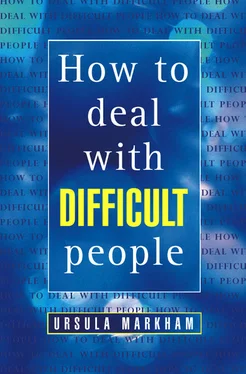Ursula Markham - How to Deal With Difficult People
Здесь есть возможность читать онлайн «Ursula Markham - How to Deal With Difficult People» — ознакомительный отрывок электронной книги совершенно бесплатно, а после прочтения отрывка купить полную версию. В некоторых случаях можно слушать аудио, скачать через торрент в формате fb2 и присутствует краткое содержание. ISBN: , Жанр: unrecognised, на английском языке. Описание произведения, (предисловие) а так же отзывы посетителей доступны на портале библиотеки ЛибКат.
- Название:How to Deal With Difficult People
- Автор:
- Жанр:
- Год:неизвестен
- ISBN:978-0-00-738171-5
- Рейтинг книги:4 / 5. Голосов: 1
-
Избранное:Добавить в избранное
- Отзывы:
-
Ваша оценка:
- 80
- 1
- 2
- 3
- 4
- 5
How to Deal With Difficult People: краткое содержание, описание и аннотация
Предлагаем к чтению аннотацию, описание, краткое содержание или предисловие (зависит от того, что написал сам автор книги «How to Deal With Difficult People»). Если вы не нашли необходимую информацию о книге — напишите в комментариях, мы постараемся отыскать её.
A concise, straightforward book on how to handle difficult people in your personal or professional life.
How to Deal With Difficult People — читать онлайн ознакомительный отрывок
Ниже представлен текст книги, разбитый по страницам. Система сохранения места последней прочитанной страницы, позволяет с удобством читать онлайн бесплатно книгу «How to Deal With Difficult People», без необходимости каждый раз заново искать на чём Вы остановились. Поставьте закладку, и сможете в любой момент перейти на страницу, на которой закончили чтение.
Интервал:
Закладка:
This sort of negative feeling wastes so much time. Whether the interview (or the Monday) goes well or not, you will have spoiled the intervening time by spending it in a state of dread.
How Do You Respond to Criticism?
There are some people who just love to criticize others. It makes them feel good and gives them a sense of power. Like the bully who will only torment an obvious victim, the more response the critic gets from the object of his remarks, the more he will continue. And, also like the bully, critics tend to be moral cowards; putting others down helps them to disguise their own insecurities and have an inflated opinion of themselves. (I am not talking here of genuine, concerned criticism given in a constructive way but of those who enjoy making other people feel small).
Is your immediate response to such criticism to become defensive? Or perhaps you assume that the critic must be right (how he would love that) and take all his comments to heart without stopping to analyse their validity. As you will discover, there are ways of stopping the malicious critic and dealing assertively with the situation.
Do You Have a Permanently Negative Outlook?
Tell yourself often enough that ‘Everything has gone wrong since I moved into this house’ and it will continue to do so. Convince yourself that you are having ‘one of those days’ and you will. Not only will your own negativity make you see only the down side of every event, it will also draw out the negativity in others.
If you find yourself behaving in this way, it is worth stopping and taking stock of the realities of your situation. What really has gone wrong since you moved into your house? Make a list and study it. Are some of the items on the list things that would have happened anyway, wherever you were living? Are they all really as bad as all that? Now make a list of all the things that have gone right since you came to live there – things you may not have stopped to consider from the depths of your negative hole. Great or small, I’m certain that if you are honest you will be able to find a number of things to put on the positive side. (For one thing, you are well enough to be sitting there making the list.)
Even when you look at that list of ‘wrongs’, can it all really be the fault of the house, the day, the weather – or whatever else you have convinced yourself is to blame? Try being more positive and making a note of good things as they happen to you – even the little ones. It really works.
Do You Swallow Your Feelings – Both Good and Bad?
Do you find it difficult to say ‘I love you’ or ‘I’m disappointed in what you did’? Of course you may be able to say one and not the other. Many people have been brought up to think that they have to be polite and not do or say anything to upset anyone else. That is fine – but not when it means accepting poor manners or shoddy workmanship. There is nothing wrong in expressing what you feel provided you do so in a way that is productive rather than aggressive. You will never lose your true friends – and those people who aren’t true friends don’t matter anyway.
Disguising your emotions only ends up hurting you. It causes a build-up of stress as you turn your feelings in on yourself rather than dealing with them. Your opinion of yourself will become ever lower as your sense of inadequacy increases. You will also cause problems for yourself in that others (particularly those difficult people) will either fail to notice you at all or will consider you a prime target. Perhaps You Believe in Saying What You Think Regardless of the Consequences?
Just stop for a moment and consider how you feel when other people act in such a way. Do you really want to cause others pain or distress?
Saying what comes into your head without considering the effect it will have on those around you will eventually turn others away from you. You are likely to end up believing that you are alone against the world. This is a sad enough feeling at any time but even worse if you realize that you brought it on yourself. You could find yourself trapped on a downward spiral of emotion from which it will be hard to emerge.
Know Your Personality Type
While conducting research into the effects of stress upon the heart, cardiologists Dr Meyer Friedman and Dr Ray Rosenman divided people into Type A and Type B personalities. They found that, even if work and living conditions were identical, Type A people were three times more likely to suffer from a stroke or heart attack, as these people were more likely to react aggressively to people and situations and therefore more likely to suffer from excess stress.
Check the lists that follow and see whether you incline more towards Type A or Type B. The ideal, of course, would be to fall somewhere in between the two. It can be fine to have a ‘laid-back’ attitude to life – but not if you constantly miss opportunities or irritate others because of it. And a certain amount of enthusiasm and ambition is laudable – but not if it causes you to ride roughshod over all and sundry.
These lists are meant to be a guide to whether you lean too much one way or the other. Don’t be concerned if you have a few of the Type A characteristics – it probably means that you are good at getting things done. But if more than half of them apply, it might be time to see what you can do to change some of your reactions to life – before you do yourself any real harm.
Type A Personality
Highly competitive
Has a strong, forceful personality
Does everything quickly
Anxious for promotion at work or for social advancement
Desires public recognition for what he has achieved
Is easily angered by people and events
Speaks rapidly
Feels restless when compelled to be inactive
Likes to do several things at once
Walks, moves and eats quickly
Is made impatient by delay
Is very conscious of time – thrives on having to meet deadlines
Is always on time
Has taut facial muscles and/or clenches fists
Type B Personality
Not competitive – at work or play
Has an easy-going, relaxed manner
Does things slowly and methodically
Is relatively content with present work situation
Is satisfied with social position
Does not want public recognition
Is slow to be aroused to anger
Can enjoy periods of idleness
Speaks slowly
Prefers to do one thing at a time
Walks, moves and eats in a leisurely way
Is patient – not easily upset by delay
Is not time conscious; tends to ignore deadlines
Is frequently late
Has relaxed facial muscles/does not clench fists
Why Are You as You Are?
Whatever your personality and however you react to difficult people, the pattern will have been set many years ago, probably in early childhood. People and events over which you had no control will have conspired – often unwittingly – to create the self-image with which you have grown up. And if you are someone who finds it impossible to stand up to difficult people or to handle them in a satisfactory way, your self-esteem is likely to be lower than it should be. The good news is that it does not have to stay that way. It is possible at any stage in life to improve your self-image and increase your confidence.
Let’s have a look at some of the most common reasons for a poor self-image and see whether you can relate to any of them.
The first people with whom you formed any kind of relationship were your mother and father (or those who stood in that position). From their attitude towards you and their opinion you will have formed a view about yourself and your ‘value’. Some parents, of course, are deliberately unkind to their children, inflicting mental, physical or emotional damage. Fortunately, however, such parents make up only a small minority. But it is all too possible for the kindest and most well-meaning of adults to inflict harm, too – although they would probably be shocked if they knew they had done so. Those who are over-protective, doing everything for their child and fighting all his battles, may create an adult who has learned to be so dependent that he is quite unable to stand on his own feet. Those who care and provide for their children but find it difficult to be demonstrative (possibly due to defects in their own upbringing) may cause those children to believe that they are unworthy of love and affection – unlovable in fact.
Читать дальшеИнтервал:
Закладка:
Похожие книги на «How to Deal With Difficult People»
Представляем Вашему вниманию похожие книги на «How to Deal With Difficult People» списком для выбора. Мы отобрали схожую по названию и смыслу литературу в надежде предоставить читателям больше вариантов отыскать новые, интересные, ещё непрочитанные произведения.
Обсуждение, отзывы о книге «How to Deal With Difficult People» и просто собственные мнения читателей. Оставьте ваши комментарии, напишите, что Вы думаете о произведении, его смысле или главных героях. Укажите что конкретно понравилось, а что нет, и почему Вы так считаете.












